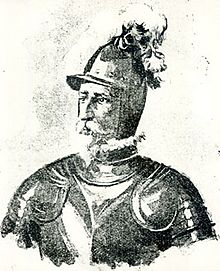Guido de Lavezaris facts for kids
Quick facts for kids
Guido de Lavezaris
|
|
|---|---|
 |
|
| 2nd Governor-General of the Philippines | |
| In office August 20, 1572 – August 25, 1575 |
|
| Monarch | Philip II of Spain |
| Governor | (Viceroy of New Spain) Martín Enríquez de Almanza |
| Preceded by | Miguel López de Legazpi |
| Succeeded by | Francisco de Sande |
| Personal details | |
| Born | c. 1512 Seville, Spain |
| Died | c. 1581 (aged 68–69) Manila, Philippines |
| Occupation | colonial administrator and official |
Guido de Lavezaris (born around 1512, died 1581) was an important Spanish leader. He served as the second Governor General of the Philippines. He took over from Miguel López de Legazpi in 1572. His time as governor ended on August 25, 1575, when Francisco de Sande became the new leader.
Early Adventures
Not much is known about Guido de Lavezaris's early life. In 1543, he joined the Villalobos Expedition. This journey explored the Philippines. During the trip, he was the royal treasurer. This meant he managed the expedition's money. Later, he was captured by Portuguese soldiers. He managed to escape from a prison on Ambon Island.
Leading the Philippines
As Governor-General, Lavezaris continued the work of the first governor. He sent Juan de Salcedo, Legazpi's grandson, to explore. Salcedo led about 100 Spanish soldiers to northern Luzon. They conquered parts of the Ilocos Region and founded Villa Fernandina. Lavezaris also took control of the Camarines area. He gave large land grants, called encomiendas, to his loyal military leaders. These grants allowed them to collect taxes from the local people.
In 1574, a famous Chinese pirate named Limahong tried to invade the Philippines. Lavezaris successfully defended the islands. He defeated Limahong's forces. However, in 1575, a Spanish priest named Martín de Rada complained to King Philip II of Spain. The priest said Lavezaris was misusing his power. He was also accused of making the local people pay too much in taxes. Because of these complaints, King Philip II removed Lavezaris from his position.
Life After Governorship
Guido de Lavezaris never went back to Spain. He retired as a very rich encomendero. This meant he owned a lot of land and collected taxes from it. His replacement, Francisco de Sande, issued a new rule in 1576. This rule divided Lavezaris's large land holdings into smaller pieces. These smaller lands were then given to the native people. Sande also made accusations against Lavezaris. He claimed Lavezaris had unfairly taken land. However, King Philip II later cleared Lavezaris of these charges.
The town of Lavezares, Northern Samar in the Philippines is named after him.
See also
 In Spanish: Guido de Lavezaris para niños
In Spanish: Guido de Lavezaris para niños
 | Laphonza Butler |
 | Daisy Bates |
 | Elizabeth Piper Ensley |

